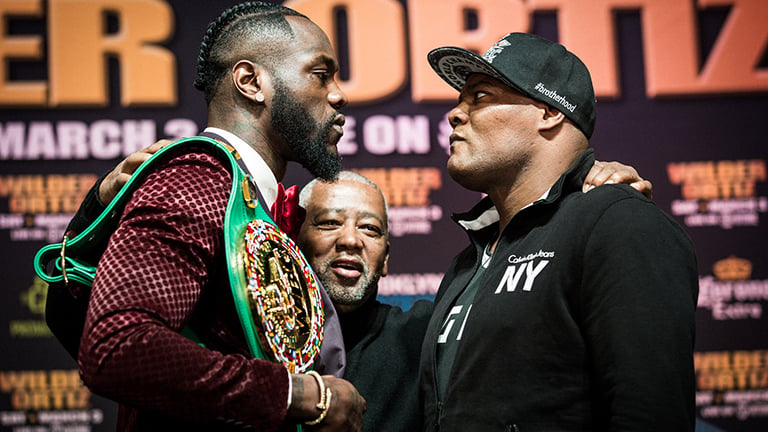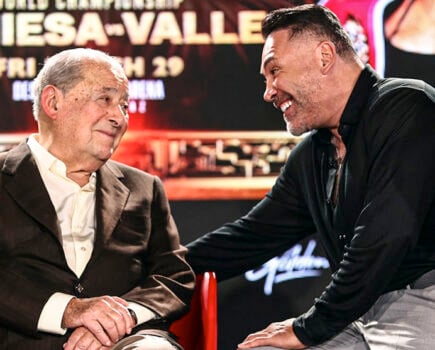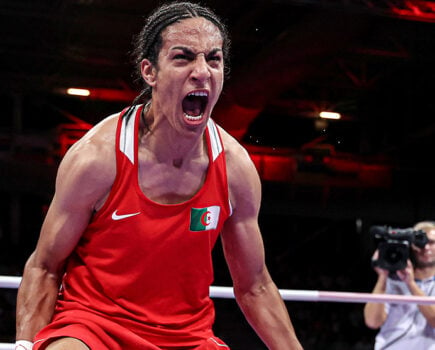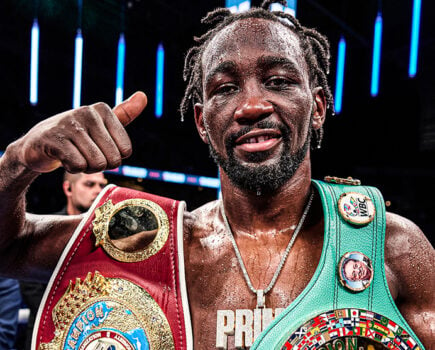IF you’re going to be the bearer of bad news it’s advisable to get in there quickly and deliver yours before your rival has the opportunity to deliver theirs. Beat them to the punch, so to speak.
In the case of Deontay Wilder, the WBC world heavyweight champion, today’s announcement that he will rematch Luis Ortiz in September could not have been timed any better, coming as it does just days before his rival Anthony Joshua defends his WBA, IBF and WBO heavyweight belts against Andy Ruiz Jnr in New York.
No mere coincidence, Wilder’s decision to announce the Ortiz return this week of all weeks serves to momentarily take the play away from Joshua and, better yet, removes from Joshua the option to use Wilder as a promotional tool during fight week. Essentially, it’s sneaky, it’s clever. It’s the right thing to do.
If you cast your mind back a week or so, all the talk was of how Joshua vs. Ruiz Jnr was a stepping stone towards the inevitable Big One: Joshua vs. Wilder. There was mention of Wilder being ringside for the fight – a claim swiftly refuted by Wilder’s co-promoter, Shelly Finkel – and Eddie Hearn, Joshua’s promoter, reiterated the need to “put it on” Wilder and his team once Ruiz had been swatted away at Madison Square Garden on Saturday night. Optimists interpreted these as the sounds of momentum building, while cynics, on the other hand, erred more on the side of caution, attributing this kind of talk more to the need to sell Joshua vs. Ruiz than bring to life Joshua vs. Wilder.
Now there’s no need to speculate. Thanks to today’s announcement, Wilder has cleverly put a stop to any notion of him being next for Joshua, and has, by posting his own schedule in favour of being used as a potential name and date on someone else’s, taken control back. Best of all, he has done away with the pretence.
“To all my fans, I want to announce that Luis Ortiz and I have signed for a rematch, with the date and site to be announced shortly,” Wilder, 33, wrote on social media. “All my controversial fights must get dealt with ASAP!”
As news of Wilder vs. Ortiz II broke, many were quick to deride the champion for fighting someone other than Joshua, or even Tyson Fury, the other Briton with whom Wilder shares a December draw. Others, meanwhile, questioned Wilder’s use of the term ‘controversial fight’, pointing to the fact the American, despite some rocky spells, still ended up stopping Ortiz inside the distance last March. (Controversial is a phrase more applicable to Wilder’s draw with Fury.)
However, based on the pair’s brilliant first encounter, as well as Ortiz’s form since that night, a rematch between Wilder and the Cuban is a marked improvement on Wilder’s last outing against Dominic Breazeale, as well as Joshua vs. Ruiz and Tyson Fury’s upcoming bout with Tom Schwarz. It’s an upgrade because Ortiz, though (at least) 40, boasts a skillset beyond the comprehension of the likes of Breazeale, Ruiz and Schwarz, and is arguably the best heavyweight without some sort of title (if we imagine Fury’s invisible lineal heavyweight title is actually something tangible).
Remember, before being stopped by Wilder, Ortiz dominated the majority of their fight from centre ring and hurt the champion on more than one occasion. He used poise, patience and refined moves to keep Wilder off balance and wary of setting his feet. He controlled the ring. His defence was tight. He seemed, by the halfway mark, to be on en route to securing an upset win and applying the first loss to Wilder’s unbeaten record.
That Ortiz ultimately fell short says as much about Wilder’s incredible knockout power as it does Ortiz’s limitations or propensity to fade late in a fight. Moreover, the fact it is considered Wilder’s career-best win owes everything to Ortiz demonstrating, for six or seven rounds, he possesses a level of technical ability most in the division lack.
“Ortiz was getting ready to stop him and Ortiz is at least 45 years of age,” Chris Byrd, a former IBF and WBO world heavyweight champion, told Boxing News last year. “If he had thrown three or four more punches, he would have stopped Wilder.
“Ortiz gave Deontay Wilder problems because he was like, ‘I’m six-four, I’m big, and I’m not worried about this guy because he doesn’t know how to fight.’ That was what Deontay Wilder found out.”
Byrd, a fellow southpaw who often battled bigger heavyweights, appreciates what he sees when he watches Ortiz, as does Larry Merchant, a former HBO stalwart, who told me a couple of years ago, long before Ortiz even fought Wilder, that the Cuban was perhaps the best heavyweight of the lot. “Ortiz is the unknown among the unknown,” he said. “He has the least sale-ability. But, if fighting any of the current champions, I don’t see which one of them beats him.”
This is not an attempt to sell Ortiz as a Wilder opponent, nor an attempt to say Ortiz, a man with a chequered history of failed drug tests, is the heavyweight contender we need in this time of confusion and deliberation. (He certainly isn’t.) Instead, it is merely pointing out that, as far as alternative options go, Luis Ortiz, 31-1 (26), is far from the worst and is in fact the kind of heavyweight the likes of Joshua and Fury have yet to face.
Admittedly, for as long as they all avoid each other, there are no winners or good guys in this situation. Not Wilder, not Joshua, and not Fury. It’s also true that Wilder, 41-0-1 (40), shouldn’t necessarily receive praise for rematching Ortiz, not when there are at least two better options out there.
But given everything else we are being fed and must stomach, not only this summer but moving forwards, he shouldn’t be condemned, either. Because if boxing’s big men are all as bad as each other (and they are), at least Deontay Wilder, in fighting Luis Ortiz twice, as well as Tyson Fury, is making the best of a bad situation.






